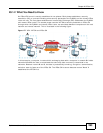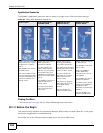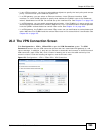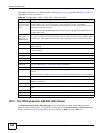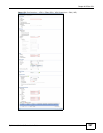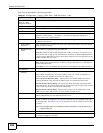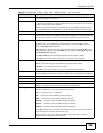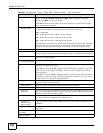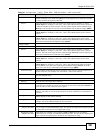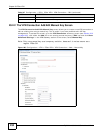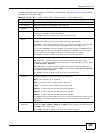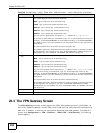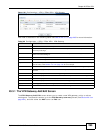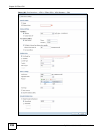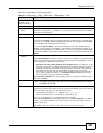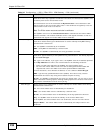
Chapter 20 IPSec VPN
ZyWALL 110/310/1100 Series User’s Guide
291
Source NAT This translation hides the source address of computers in the local network. It may
also be necessary if you want the ZyWALL to route packets from computers outside
the local network through the IPSec SA.
Source Select the address object that represents the original source address (or select
Create Object to configure a new one). This is the address object for the computer
or network outside the local network. The size of the original source address range
(Source) must be equal to the size of the translated source address range (SNAT).
Destination Select the address object that represents the original destination address (or select
Create Object to configure a new one). This is the address object for the remote
network.
SNAT Select the address object that represents the translated source address (or select
Create Object to configure a new one). This is the address object for the local
network. The size of the original source address range (Source) must be equal to the
size of the translated source address range (SNAT).
Inbound Traffic
Source NAT This translation hides the source address of computers in the remote network.
Source Select the address object that represents the original source address (or select
Create Object to configure a new one). This is the address object for the remote
network. The size of the original source address range (Source) must be equal to the
size of the translated source address range (SNAT).
Destination Select the address object that represents the original destination address (or select
Create Object to configure a new one). This is the address object for the local
network.
SNAT Select the address object that represents the translated source address (or select
Create Object to configure a new one). This is the address that hides the original
source address. The size of the original source address range (Source) must be
equal to the size of the translated source address range (SNAT).
Destination NAT This translation forwards packets (for example, mail) from the remote network to a
specific computer (for example, the mail server) in the local network.
Add Click this to create a new entry. Select an entry and click Add to create a new entry
after the selected entry.
Edit Select an entry and click this to be able to modify it.
Remove Select an entry and click this to delete it.
Move To change an entry’s position in the numbered list, select it and click Move to display
a field to type a number for where you want to put that entry and press [ENTER] to
move the entry to the number that you typed.
# This field is a sequential value, and it is not associated with a specific NAT record.
However, the order of records is the sequence in which conditions are checked and
executed.
Original IP Select the address object that represents the original destination address. This is the
address object for the remote network.
Mapped IP Select the address object that represents the desired destination address. For
example, this is the address object for the mail server.
Protocol Select the protocol required to use this translation. Choices are: TCP, UDP, or All.
Original Port Start
/ Original Port End
These fields are available if the protocol is TCP
or UDP. Enter the original destination
port or range of original destination ports. The size of the original port range must be
the same size as the size of the mapped port range.
Mapped Port Start
/ Mapped Port End
These fields are available if the protocol is TCP or UDP. Enter the translated
destination port or range of translated destination ports. The size of the original port
range must be the same size as the size of the mapped port range.
Table 107 Configuration > VPN > IPSec VPN > VPN Connection > Edit (continued)
LABEL DESCRIPTION



